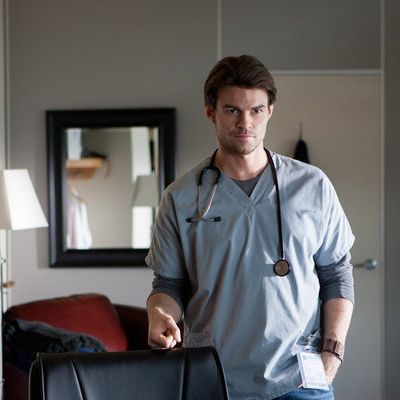
Inspired by NBC’s hospital drama Saving Hope, here is a list of Things I Can Do Without.
1. Two-word gerund/noun titles, especially if the second word has a lame, forced double meaning.
Example: NBC’s summer burn-off series Saving Hope, which debuts tonight at 9 p.m. Eastern. It’s set at Seattle’s fictional Hope-Zion hospital, but it’s also about doctors and nurses struggling to hold onto optimism — onto hope, by golly! — in a grueling job with life-or-death stakes. Taking Chance, Finding Bliss, Saving Grace, Raising Hope (which is a good show, but still!). Licking Fear, Fingering Charity. Those last two shows don’t exist, but betcha they’re in development. This type of faux cleverness is so widespread that I’m still pleasantly surprised that Breaking Bad isn’t about a guy named Walter Bad.
2. Big city hospital dramas populated by under-40 actors who are all smokin’ hot and who flirt and sometimes get it on in supply rooms despite having worked hours that would kill a twelfth-century galley slave, and who appear impeccably coiffed and groomed at all times, and whose hospital scrubs are obviously tailored to show off the muscles they purchased by spending two hours a day at the gym with their personal trainers.
At least Saving Grace’s chief of surgery Charlie Harris (Michael Shanks of Stargate SG-1) has a reason to be wearing a tux: It’s the outfit he was wearing when a runaway car struck the cab carrying him and his fiancée, surgeon Alex Reid (Erica Durance of Smallville), to their wedding, put Charlie in a coma, and turned his wry spirit loose to wander the hospital halls and muse on life, death, and the universe in voice-over.
But the other characters have no such excuses. They’re so glamorous they make the cast of Grey’s Anatomy look old and frumpy. Durance, who is also credited as a producer, has bee-stung lips, immaculately sculpted eyebrows, a cinched-waist hourglass figure, and a forehead so smooth that the New Jersey Devils could practice on it; even when she’s weeping over her comatose fiancé or wandering around in a fog of grief, she always looks as if she just returned from four weeks in Beverly Hills’ most exclusive spa. Her ex-boyfriend and resident George Clooney–on-E.R. stand-in, Joel Goran (Daniel Gillies, The Vampire Diaries), always appears to have three days’ growth of beard no matter what day it is, and it’s neatly trimmed all around.
3. Medical dramas wherein big city hospitals lose patients left and right for reasons that make it seem as though the show is set in 1912 rather than 2012.
If you only knew about hospitals from watching TV, you might think there was an epidemic of sudden, unexpected death during childbirth.
Yes, indeed, I’m spoiling a plot event here. I apologize to those of you who never watched any of the dozens of other doctor series on which such things have happened and that at least had the grace not to telegraph the events so obviously.
4. Medical dramas wherein arrogant but secretly empathetic doctors make decisions contrary to patients’ forcefully expressed wishes — and the patients thank them for it.
The Saving Hope pilot has a subplot about an Afghanistan war vet with PTSD who wants his infected right arm amputated even though there might be a way to save it. I could believe that Charlie, the vet’s original doctor, might have been distracted by wedding preparations when he approved this operation, rather than a total idiot. And I can believe that his replacement Joel might refuse to amputate the arm on the grounds that the operation isn’t necessary. But I can’t believe that his colleagues at the hospital would back Joel’s impulsive decision to perform an operation different from the one that was approved by the vet, the hospital, and presumably by the patient’s insurance company. I realize this is a scripted drama, not a documentary, but it’s not a fantasy. Seriously, people.
5. TV dramas or comedies or movies or novels that feature a disembodied spirit as a hero, without thinking through the implications of what it might mean to exist in that state.
I watched a couple of episodes of Saving Hope before writing this review. Midway through the second episode I started fixating on Charlie, the comatose spirit surgeon wandering the hospital, and thinking, If I were in his situation, what would I do? I have no desire to find out anytime soon, of course, but I can tell you this for sure: If the unthinkable happened to me just as it did to Charlie, after I dealt with whatever grief and shock I was carrying around, I’d take advantage of my non-corporeal freedom and live a bit.
First I’d try to find out if it was possible to eat, drink, smoke, or screw despite having no physical form, and if it turned out I could, I’d probably spend the next weeks or months living a life of astounding debauchery in the company of other unchained spirits. After I got that out of my system, I might see every movie at a film festival without having to buy a ticket, take in every show in every local theater, view every piece of art in every New York museum, then go to the New York Public Library and read up on the history of everything. Then I’d stow away in the cargo hold of a jet and fly to Paris or Tokyo or some other city I’d never been to, and I wouldn’t wait for the plane to land; I’d dive out in mid-air and bellow the lyrics to Tom Waits’s “Step Right Up” as I plunged to earth.
If I were a wandering spirit, I might do a lot of other things, too — things I can’t even conceive of right now. But I can promise this: I damn sure wouldn’t spend all of my time wandering around hospital halls eavesdropping on my co-workers, no matter how good-looking they were.





